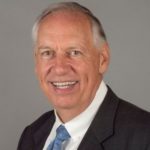Op-Ed: The Real Divide in Washington Goes All the Way Back to Genesis
The book of Genesis is foundational to developing a biblical worldview. This book sets the stage for the 65 following books of the Bible. Herein the big questions of life are answered.
Questions regarding the meaning of our existence cannot be answered satisfactorily apart from revelation regarding the origins of life.
Take, for example, the debate between creation and evolution. Was the world created by God, or did it evolve from a single cell that evolutionists have yet to explain that was floating in a universe they have also yet to explain?
These beliefs represent worldviews at separate ends of the spectrum. Whereas Darwinians believe everything evolved from a pre-existing cell, creationists believe in intelligent design. The former is the seedbed of attitudinal pride, and the latter of humility.
Implicit in Genesis 1:26 is the significant idea that man, unlike the remainder of God’s creation, was and is created in his image and likeness. Mankind is thus at the top of God’s creative order. No other aspect of his creation was formed in his image.
While belief in special creation breeds reverence and dependence on God, belief in evolution is foundational to anthropocentric thinking and supposed solutions — which, according to the Bible, is fallen thinking. The two worldviews lead to vastly different convictions in public policy.
It should come as no surprise that a country bent on jettisoning its Judeo-Christian worldview in favor of humanistic secularism would have problems agreeing on issues in its representative chambers.
Legislators end up trusting in either Bible-centered or man-centered solutions to most issues and are often worlds (worldviews) apart. This analysis identifies the real divide in Washington. Special creation is a basic, immutable truth that must be held onto at all costs.
This week’s Bible study, “Genesis: Basic Immutable Truths for Public Servants,” examines not only issues of the origins of life and how that plays itself out per the above, but it also delves into various complex issues that face public servants and believers today, such as resource development versus radical environmentalism.
In Genesis we learn that man is given stewardship of the earth; it is incumbent upon mankind to take care of God’s creation. The biblical idea of rule (literally, “to have dominion”) is commanded by God prior to the Fall of man (Genesis 3). This is an important distinction to make since the Fall warps the stewardship of man.
Nonetheless, God desires mankind to add value to the natural resources he has entrusted to them for their own benefit and blessing. But now, post-Fall, added value and prosperity will only result from hard labor.
In this regard, 3:16-17 states that being created in God’s image (imago Dei in Latin) does not give man the right to a bulldozer mentality. Mankind is to steward the earth with respect for the Creator’s creation.
However, Genesis more than suggests that man should not merely conserve, but rather develop the many natural resources God has given him to cultivate for his own benefit and advancement.
The Sierra Club (during its early years when I was brought up in it and a card-carrying member) used to state this balance in a wonderfully succinct way: “Not in blind opposition to progress, but in opposition to blind progress.” That sentence is a good way for public servants to hold in tension the truths of Genesis 1:26 and 3:17-19.
This Bible study also examines some revealed attributes of God, including what he says about his existence, that he is separate from his creation, the supernatural origin of the universe, and that the Bible is indeed his infallible Word to mankind.
Grasping these insights into God’s character is a prerequisite to examining and properly understanding Genesis’ major expounded themes, including that God wants there to be a diversity of nations. In this vein, the study examines the crisis in Ukraine through the lens of Genesis principles.
This study shows how the book of Genesis is foundational to a biblical worldview. As a public servant or as believers who are not public servants, you should know the passages in this study, recognize their connection and integration, and allow God’s revelation to mankind to guide and convict your thinking and actions.
I trust this study will prove to be practical and helpful. My prayer is that together, God will grant us a movement for Christ among public servants nationwide in the years to come. Toward that end we labor. Click here to read the entire study.
The views expressed in this opinion article are those of their author and are not necessarily either shared or endorsed by the owners of this website. If you are interested in contributing an Op-Ed to The Western Journal, you can learn about our submission guidelines and process here.
Truth and Accuracy
We are committed to truth and accuracy in all of our journalism. Read our editorial standards.
Advertise with The Western Journal and reach millions of highly engaged readers, while supporting our work. Advertise Today.












